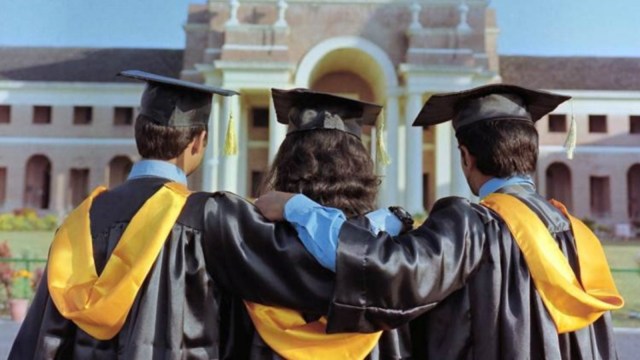‘I couldn’t believe it’: F-1 status of some Indian students restored after US reverses abrupt termination of visa registration
Immigration attorneys in the US confirmed that reinstatements have begun but remain uneven and mainly pertain to students whose student visas were revoked over “small” violations.
 Indians constituted the largest international student cohort in the US in 2023-24, according to data from Open Doors. Of the 11.26 lakh international student, 3.31 lakh were from India (29% of the total), followed by 2.77 lakh from China.
Indians constituted the largest international student cohort in the US in 2023-24, according to data from Open Doors. Of the 11.26 lakh international student, 3.31 lakh were from India (29% of the total), followed by 2.77 lakh from China.It was 3 am in Atlanta on Friday, the 20-year-old student from Bengaluru recalls, when the good news came.
His status as an F-1 student had been in limbo since April 4 when his record on SEVIS — the Student and Exchange Visitor Information System, a US government database that tracks international students — was terminated following a drunk driving charge that had not led to a conviction. He was preparing to file a lawsuit when, on April 24, his status on the SEVIS portal showed “active” again.
“I couldn’t believe it. I was just about to file (the lawsuit). And then it got reactivated. No reason given,” said the third-year engineering student. “For now, I’m relieved… but I’m still scared. If this hadn’t happened, I would probably have had to leave everything midway and go back home.”
Across the US, several Indian students, whose SEVIS records were recently terminated — over minor infractions like speeding tickets or dismissed misdemeanours — have seen their statuses re-instated in the last 48 hours. In some cases, this happened even without filing lawsuits.
At a court hearing in Washington Friday, a Justice Department lawyer told a federal judge that the Department of Homeland Security (DHS) was developing a new system for reviewing and terminating international student records. Until then, records recently purged from the federal database would be restored, reinstating students’ legal status.
This relief comes amid a nationwide crackdown over “illegal immigrants,” that has seen F-1 visa-holders being targeted and federal funding cuts to campuses.
Indians constituted the largest international student cohort in the US in 2023-24, according to data from Open Doors. Of the 11.26 lakh international student, 3.31 lakh were from India (29% of the total), followed by 2.77 lakh from China. The American Immigration Lawyers Association (AILA) announced that about 50 per cent of the 327 international students, whose US visas were revoked, are Indian.
Immigration attorneys in the US confirmed that reinstatements have begun but remain uneven and mainly pertain to students whose student visas were revoked over “small” violations, not for involvement in what is being alleged as pro-Palestinian and anti-Semitic protests.
“A few students have begun seeing their SEVIS status reactivated. It’s not happening for everyone yet, but it seems to have started,” said Chand Parvathaneni, an attorney in Texas assisting several students with revoked student visas. “Hopefully, more students will see updates by Monday…(Perhaps) the government is moving toward a more case-by-case approach, reserving termination only for serious cases.”
The Indian Express spoke to a 31-year-old Indian student pursuing Information Systems and Technology at a university in Delaware, whose SEVIS was reactivated after being terminated following a DUI arrest last year.
“On April 4, my SEVIS was deactivated. I was scared. I didn’t tell my family anything. I had taken a loan to study here,” he said. “My friends encouraged me to fight it. But before I could file a lawsuit, my SEVIS was reactivated. I’m relieved but the fear remains.”
One factor behind the easing, experts said, could be the lawsuits filed by hundreds of international students challenging their visa revocations who argued they had lost their legal right to study in the US with little explanation. Courts responded with a flurry of emergency orders blocking US Immigration and Customs Enforcement (ICE).
These emergency orders only provided temporary reprieve to students who had gone to court. Among them was a 24-year-old student from Telangana, pursuing a Master’s in Information Technology at Saint Louis University in Missouri. His F-1 visa was revoked over a speeding violation during his learner’s permit phase, and he had initially planned to appeal. Now, he said, he, too, had received SEVIS reinstatement after filing a lawsuit and securing a Temporary Restraining Order (TRO).
“I can stay for my exams now. That’s a huge relief. But the anxiety is still there. I did everything legally — went to court, got my license — and still ended up here. If my SEVIS hadn’t been restored, I don’t even know if I would’ve graduated,” he said.
Parvathaneni explained that TROs had bought time for students who filed lawsuits, but the sudden restorations for others may signal a broader government shift.
“When a lawsuit is filed, the judge typically cannot make an immediate final decision. So based on the initial facts, courts often issue temporary restraining orders — short-term protections that prevent immediate harm to students while the case proceeds. These temporary orders essentially tell the government to hold off on enforcement actions until a final decision is made. In the context of the SEVIS terminations, with so many lawsuits now pending, it seems the government may be re-evaluating its overall approach, rather than waiting for each case to be decided individually,” he said.
When contacted, a senior Department of Homeland Security (DHS) official told The Indian Express: “Due to privacy concerns and visa confidentiality, the Department of Homeland Security generally does not comment on specific cases.”
The American Immigration Lawyers Association (AILA) also confirmed April 25 that members had reported SEVIS restorations beginning the day before. It added that it had not “received reports of SEVIS restoration for individuals whose SEVIS records were terminated for political protest”
No formal announcement has been made yet by U.S. Immigration and Customs Enforcement (ICE). AILA has advised students to check their SEVIS portals and work with Designated School Officials (DSOs) to correct any remaining errors.
For many students, however, the anxiety persists.
A 26-year-old student from Michigan, pursuing a Master’s in Data Science, who also got his TRO said that many others were still stuck outside the US unable to even attempt a lawsuit because their visas had also been revoked. “At least I have a fighting chance…If my SEVIS hadn’t been restored, I would have lost everything. I lost the project I was working on, and we are still confused as to whether our employers will take us back or if we should apply for fresh jobs.”







